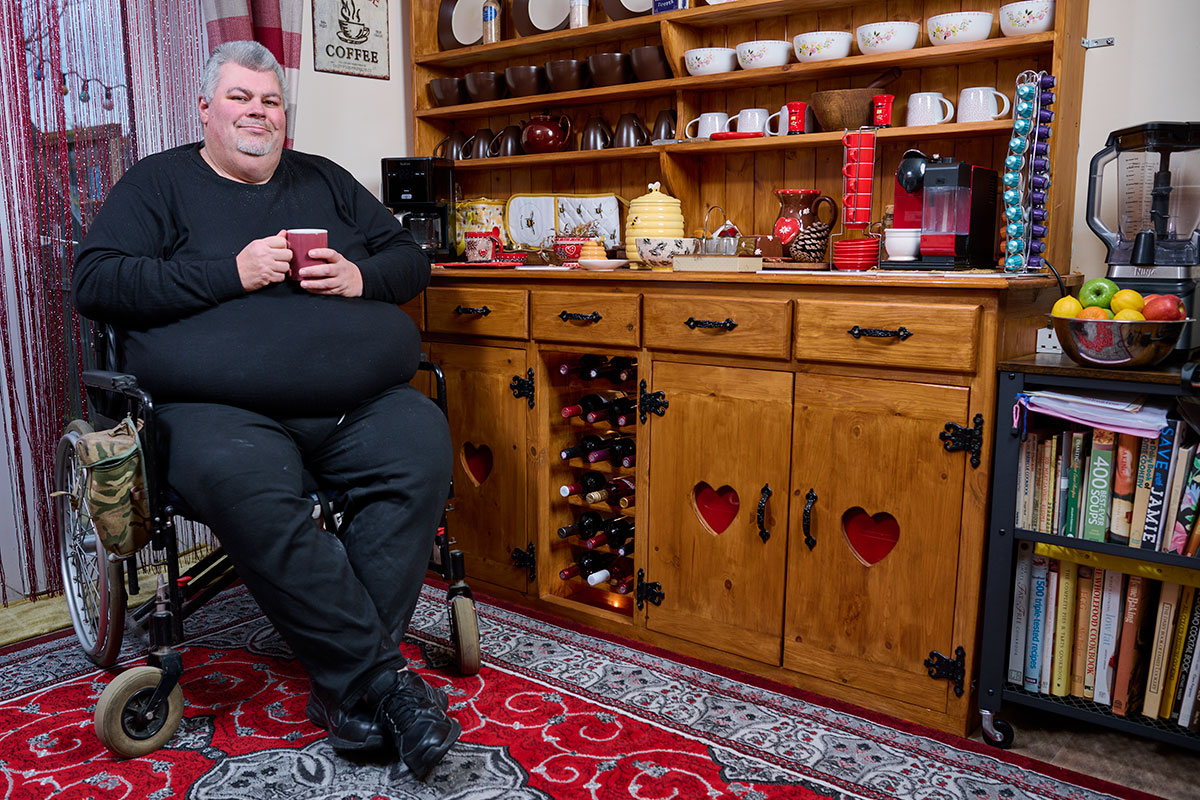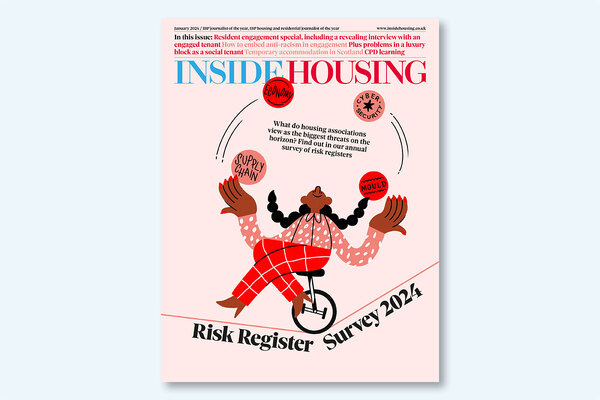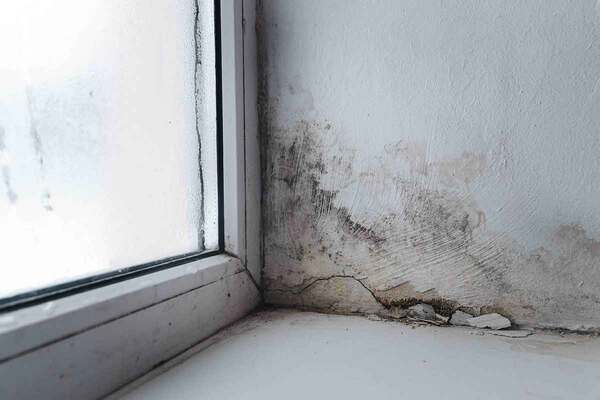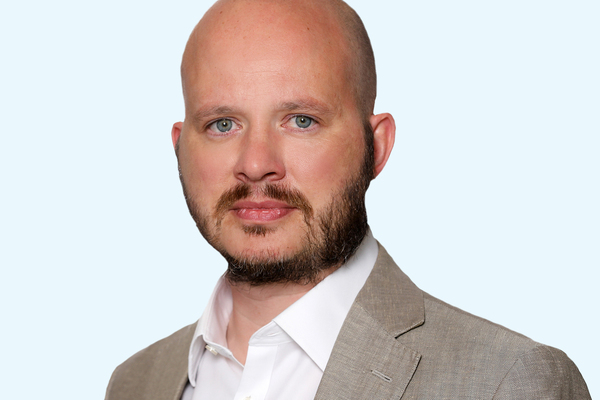You are viewing 1 of your 1 free articles
Tenant insight: inside tenant efforts to change the culture of social landlords
Neal Wylde is one of the most influential tenants in England and has helped shape many of the efforts to improve the housing sector in recent years. But does he think the tenant voice is being heard? He speaks to Jess McCabe. Photography by Mike Harrington
You don’t go to Neal Wylde if you want things sugar coating. It is clear after only a few minutes of our chat on Teams that the 12-year social housing tenant and regular panel member is nothing if not a straight talker.
Asked about how the sector is doing on implementing the changes all agree are needed after Grenfell and the tragic death of two-year-old Awaab Ishak, he says: “They have got their heads so deeply buried in the sand, [and] they are scared of bringing them out.”
If that sounds blunt, a look at the activities of the Housing Ombudsman perhaps suggests it is not – in the time since our last issue was published, the ombudsman has launched an investigation into three London landlords over their rates of maladministration findings, and published shocking case studies on two more major landlords over maladministration.
It is also worth noting that Mr Wylde is in a uniquely good position to talk about these issues.
He has previously been involved in the scrutiny panel of his own landlord, but has also been actively involved in many of the national attempts to reshape the relationship between English landlords and their residents in recent years.
Using his voice
The Together with Tenants charter? He was one of the residents on the tenant advisory panel.
The Better Social Housing Review (BSHR)? He was on the panel of that as well.
Housing Ombudsman? He is on the resident panel.
Regulator of Social Housing? He has been on that panel, too.
Inside Housing wanted to talk to Mr Wylde to find out more about where he is coming from – and what he thinks of the social housing sector’s efforts to improve.
But first, how did Mr Wylde get involved in tenant engagement?
It happened, he says, soon after he moved into social housing. Mr Wylde had a career as a manager in retail and wholesale, and later a mechanic.
“Unfortunately, I suffered from a work injury when I was young, which stopped me from working,” he says. He was privately renting at the time, but as he is a wheelchair user, the property was unsuitable. “I had an occupational therapist come around, take one look at my house and was mortified [that] I was living there. So I was put immediately onto the housing list,” he says.
When he was offered his bungalow in 2011, he went to visit multiple times to check the area was quiet at different times of the day and night. When he told his housing officer this, Mr Wylde recalls: “She was quite impressed that I’d gone to that sort of level of investigation and she said you’d probably do really well on our tenant engagement [panel]. And that’s where it started.”
Starting in 2012, Mr Wylde sat on disability groups, procurement groups and ultimately chaired the scrutiny panel of his own housing association – but we’ll come back to that later.
His work nationally started in 2019. “I got a weird email saying [the] National Housing Federation (NHF) is looking for tenants to join its tenant advisory panel. And I sent back quite a blunt CV, saying, ‘I’m your worst tenant, I’m in a wheelchair. You know, I’m your worst disability basically.’ And they said, ‘Brilliant.’ So I joined that. And since then, I’ve been on the Housing Ombudsman panel. I’m also on the Regulator [of Social Housing]’s tenant panel. I’m on the Four Million Homes panel. And then last year, because of my work with the Nat Fed, they asked me if I would join the Better Social Housing Review panel.”
This work has given Mr Wylde a perspective to rival many sector leaders, as he travels up and down the country talking to social landlords and tenants. Other tenants approach him to talk about their issues, too. He sees the attempts to shift things and, in the words of the BSHR, “to change social housing for the better”, and he sees whether attempts are successful.
Becoming a better landlord for disabled tenants
The issue of how landlords interact with disabled residents is increasingly gaining attention. In 2021, a charter was launched aimed at improving how landlords interact with disabled tenants, and to bring landlords in line with equalities legislation – particularly focused on neurodiversity and mental health.
This was followed last year by new data from the NHF, which found that although 29% of social renters are disabled, only 9% of the sector’s workforce, 6% of executives and 10% of board members are disabled.
As a wheelchair user, Mr Wylde has experienced problems himself – facing intrusive questions when he was asked why he needed an urgent repair to the wet room in his bungalow. “I’m not asking for a Bentley car. I’m just asking for a working wet room,” he notes.
Through his work, other tenants have approached him raising issues – he mentions a deaf tenant who had to argue with their landlord for the need for an adapted fire alarm device because they would not be able to hear if the alarm went off.
Mr Wylde says that national bodies like the NHF and the Chartered Institute of Housing, as well as the regulator and ombudsman, really are listening to tenants and incorporating their views.
“The work we’ve done with the regulator and the Housing Ombudsman, they are listening to the tenants and all the stuff we do. And they are making changes from what the tenants say, which is, again, a wonderful thing to happen. I think that they are all making the right steps in the right direction,” he says.
Mr Wylde is a believer in both the Better Social Housing Review and Together with Tenants, in terms of them setting out a path for social landlords to follow to improve their services.
The problem, he feels, is that landlords are signing up to these initiatives but not properly reading them, or implementing the recommendations.
“There are an awful lot of housing associations that have signed up to [the Together with Tenants] charter. There are an awful lot of housing associations that are putting it on their office wall. They’ve ticked the box, and they don’t actually read the charter and actually implement it,” he says.
So his call to the sector is a simple one: read the documents you have probably already signed up to.
“My big wish would be that any housing association who is signed up to Together with Tenants is to get that charter out. And read it really carefully, and see if they’re truly believing what that charter says.
“And I would also say, look at the Better Social Housing Review. We had five people on that panel. We’re all volunteers. We worked extremely diligently to get those recommendations [drawn] up, which we honestly believe will make a huge change in the sector,” he says.
And for chief executives and leaders, he says: be more curious and rigorous about whether policies are actually being implemented.
“When things like Together with Tenants and the Better Social Housing Review come and land on the chief executive’s desk, don’t just ask, ‘Are we doing this?’ And someone says, ‘Yes.’ Actually say, ‘I want to see the evidence that we’re doing this,’ and actually get the CEOs out of their boardrooms, out of their offices, and bring them down to the frontline.”
Not taking up recommendations
Mr Wylde has been disappointed that some recommendations have not been taken up – he points to the Better Social Housing Review’s call for landlords to set up community hubs. This was an idea that came from a housing association that had already implemented hubs, in Sunderland. The panel was so impressed, it recommended they should be rolled out by all landlords.
“A lot of housing associations have gone, ‘Well, we can’t afford to build a community hub,’” he says.
While this is understandable, he adds, landlords should be thinking outside of the box.
Snapshot of places where Neal Wylde has been on a panel
● National Housing Federation
● Housing Ombudsman
● Regulator of Social Housing
● Four Million Homes
● Together with Tenants
● Scrutiny panel of his own social landlord
“There are already community hubs out there. There are community centres, there are libraries, there are religious centres, you’ve just got to tap into them. And your community is already there to talk to,” he notes.
Another option could be for small associations to band together and hire somewhere.
More broadly, though, Mr Wylde thinks the problem is that too many chief executives are just not really in touch with what is going on in their organisations. Frontline staff, he says, are often “embarrassed” when residents point out mistakes and problems, rather than seeing an opportunity to improve.
By the time the chief executive hears about how a service is performing, the story has been “so covered in roses that he thinks, or she thinks, their housing association is fantastic”, he says. This culture prevents landlords from learning from mistakes.
While it might be hard for the sector to hear Mr Wylde’s take, as he points out, the stakes are incredibly high.
“The unfortunate thing was, we all know this [renewed attention to tenant engagement] was kicked off by Grenfell. And then we’ve had the unfortunate death since then [of a young child] due to damp and mould, and they’re still burying their heads in the sand. And it is disgusting. They’re not prepared to reach out and listen and properly talk to tenants.”
Not tapping into expertise
More broadly, Mr Wylde thinks that social landlords are just not tapping into the people with direct expertise of what is going wrong in their organisation: residents.
“We are an extremely free resource that they can draw on and get some expertise from, for a cup of tea and a couple of biscuits. That’s mostly what customer or tenant engagement is about: we come in for a meeting, have a cup of tea and a couple of biscuits and just talk stuff through.”
Instead, he says, landlords are spending money on expensive consultant fees.
Mr Wylde’s argument is not exactly revolutionary or new. There is a Bill Gates quote from his 1999 business book that is particularly widely quoted. “Your most unhappy customers are your greatest source of learning,” he wrote.
Many tenants, like Mr Wylde, have years of business experience themselves that they can lend to landlords to help them improve.
Eagle-eyed readers might have noticed that we have not mentioned which social landlord Mr Wylde is a tenant of. That is not by accident. Although Mr Wylde began his volunteer career in tenant engagement at his landlord, and was at one point chair of its scrutiny panel, currently they are not communicating – Mr Wylde says the association suspended him from the scrutiny panel.
It is difficult to get into the specifics here as Mr Wylde does not want to name the landlord.
One of the best-known tenant advocates in England might be sought-after for national panels, but his own landlord has a different view. What does this tell us about the state of tenant engagement?
Recent longform articles by Jess McCabe
Inside Housing Repairs Tracker 2024
How much did English housing providers spend on repairs and maintenance in 2022-23? Jess McCabe looks through their financial records to find out
Who has built the most social rent in the past 10 years?
Jess McCabe delves into the archives of our Biggest Builders data to find out which housing associations have built the most social rent homes
Biggest Council House Builders 2024
For the second year running, Inside Housing names the 50 councils in Britain building the most homes. But is the rug about to be pulled on council development plans? Jess McCabe reports
Inside Housing Chief Executive Salary Survey 2024
Inside Housing’s annual survey reveals the salaries and other pay of the chief executives of more than 160 of the biggest housing associations in the UK, along with the current gender pay gap at the top of the sector. Jess McCabe reports
Sign up for our tenancy management newsletter
Already have an account? Click here to manage your newsletters











